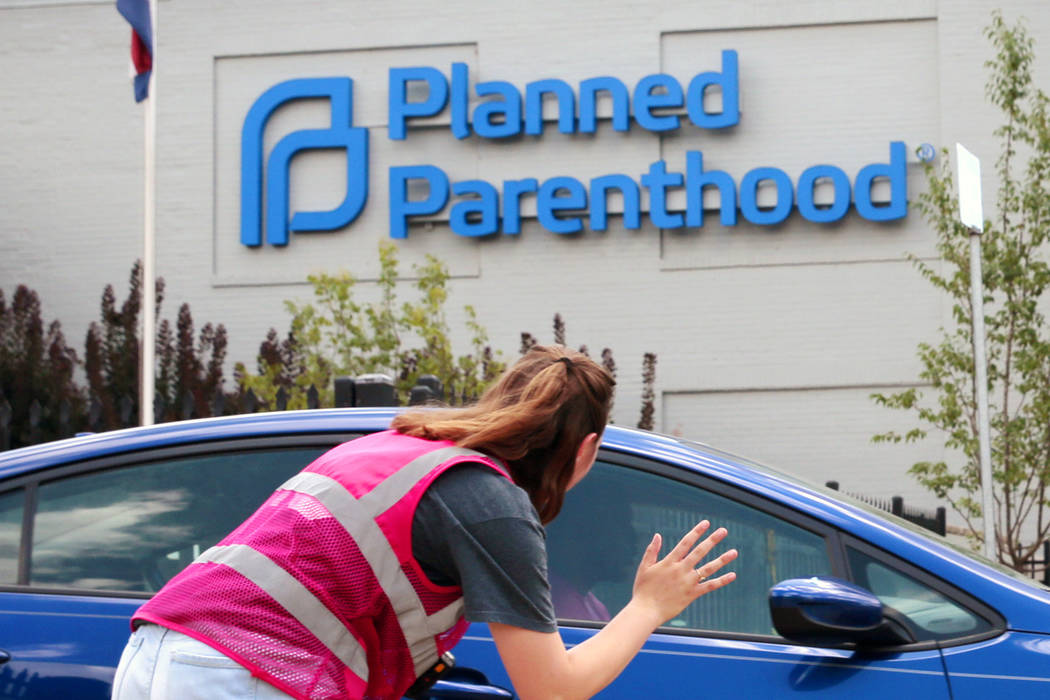Trump abortion referrals rule seen as blow against Planned Parenthood

WASHINGTON — Taxpayer-funded family planning clinics must immediately stop referring women for abortions, the Trump administration says, advancing its effort to remake government policy on reproductive health.
Ahead of a planned conference Tuesday with the clinics, the Department of Health and Human Services formally notified them that it will begin enforcing a new regulation banning abortion referrals, along with a requirement that clinics maintain separate finances from facilities that provide abortions. Another requirement that both kinds of facilities cannot share physical space would take effect next year.
The head of a national umbrella group representing the clinics said the Republican administration is following “an ideological agenda” that could disrupt basic health care for many low-income women. Abortion opponents applauded the move.
The family planning rule is being challenged around the country in court cases that have yet to resolve the core issues involved. However, a nationwide preliminary injunction that had blocked the administration was recently set aside, allowing HHS to begin enforcing the rule.
Other administration regulations tangled up in court would allow employers to opt out of offering free birth control to women workers on the basis of religious or moral objections and would grant health care professionals wider leeway to opt out of procedures that offend their religious or moral scruples.
The Trump administration’s family planning policy is widely seen as a blow against Planned Parenthood, which provides taxpayer-funded family planning and basic health care to low-income women as well as abortions that must be paid for separately. The organization is a mainstay of the federally funded family planning program and has threatened to quit over the issue.
No plans to stop fighting
Planned Parenthood President Leana Wen said in a statement that “our doors are still open” as her organization, several Democratic state attorneys general and the American Medical Association seek to overturn the ban on abortion referrals.
“We will not stop fighting for all those across the country in need of essential care,” Wen said.
HHS said no judicial orders currently prevent it from enforcing the rule while the litigation proceeds.
Clare Coleman, president of the National Family Planning & Reproductive Health Association umbrella group, said “the administration’s actions show its intent is to further an ideological agenda.”
Abortion opponents welcomed the Trump administration’s action.
“Ending the connection between abortion and family planning is a victory for common-sense health care,” Kristan Hawkins, president of Students for Life, which wants to abolish abortion, said in a statement.
Religious and social conservatives are a bulwark of President Donald Trump’s political base.
$260M granted to clinics annually
Known as Title X, the family planning program serves about 4 million women annually through independent clinics, many operated by Planned Parenthood affiliates, which serve about 40 percent of all clients. The program provides about $260 million a year in grants to clinics.
Abortion is a legal medical procedure, but federal laws prohibit the use of taxpayer funds to pay for abortions except in cases of rape or incest or to save the life of the woman.
Under the Trump administration’s rule, clinic staff would still be permitted to discuss abortion with clients, along with other options. However, that would no longer be required.
The AMA is among the professional groups opposed to the administration’s policy, saying it could affect low-income women’s access to basic medical care, including birth control, cancer screenings and testing and treatment for sexually transmitted diseases. By law, the family planning program does not pay for abortions.
Religious conservatives see the regulation as a means to end what they call an indirect taxpayer subsidy of abortion providers.
Abortion numbers falling
Although abortion remains politically divisive, the U.S. abortion rate has dropped significantly, from about 29 per 1,000 women of reproductive age in 1980 to about 15 per 1,000 in 2014. Better contraception, fewer unintended pregnancies and state restrictions may have played a role, according to a recent scientific report. Polls show most Americans do not want the Supreme Court to overturn Roe v. Wade, the 1973 ruling that legalized abortion.
The Trump administration’s policy echoes a Reagan-era regulation that barred clinics from even discussing abortion with women. It never went into effect as written, although the Supreme Court ruled it was appropriate.
The policy was rescinded under President Bill Clinton, and a new rule took effect requiring “nondirective” counseling to include a full range of options for women. The Trump administration is now rolling back the Clinton requirement.